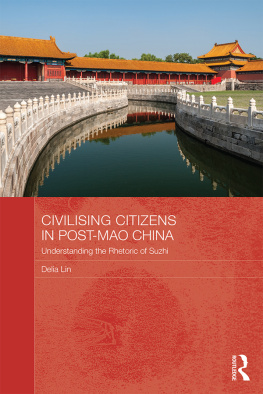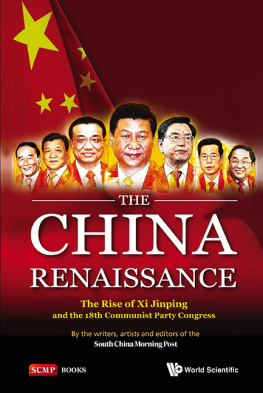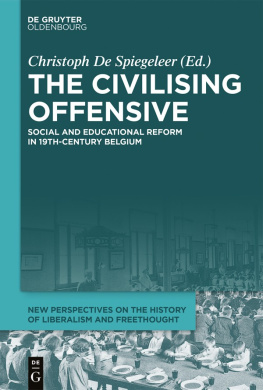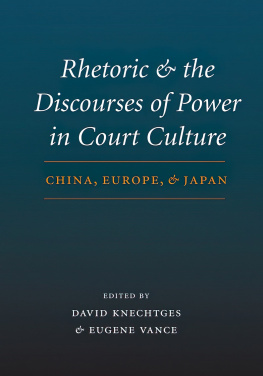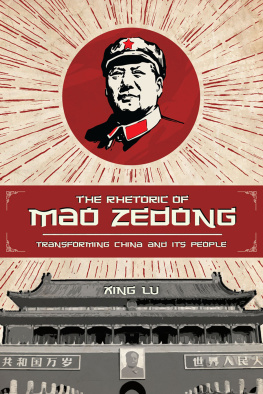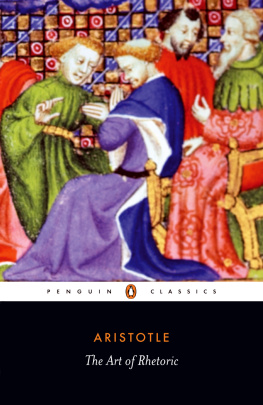Delia Lin - Civilising Citizens in Post-Mao China: Understanding the Rhetoric of Suzhi
Here you can read online Delia Lin - Civilising Citizens in Post-Mao China: Understanding the Rhetoric of Suzhi full text of the book (entire story) in english for free. Download pdf and epub, get meaning, cover and reviews about this ebook. year: 2017, publisher: Taylor & Francis Ltd, genre: Politics. Description of the work, (preface) as well as reviews are available. Best literature library LitArk.com created for fans of good reading and offers a wide selection of genres:
Romance novel
Science fiction
Adventure
Detective
Science
History
Home and family
Prose
Art
Politics
Computer
Non-fiction
Religion
Business
Children
Humor
Choose a favorite category and find really read worthwhile books. Enjoy immersion in the world of imagination, feel the emotions of the characters or learn something new for yourself, make an fascinating discovery.
Civilising Citizens in Post-Mao China: Understanding the Rhetoric of Suzhi: summary, description and annotation
We offer to read an annotation, description, summary or preface (depends on what the author of the book "Civilising Citizens in Post-Mao China: Understanding the Rhetoric of Suzhi" wrote himself). If you haven't found the necessary information about the book — write in the comments, we will try to find it.
Delia Lin: author's other books
Who wrote Civilising Citizens in Post-Mao China: Understanding the Rhetoric of Suzhi? Find out the surname, the name of the author of the book and a list of all author's works by series.
Civilising Citizens in Post-Mao China: Understanding the Rhetoric of Suzhi — read online for free the complete book (whole text) full work
Below is the text of the book, divided by pages. System saving the place of the last page read, allows you to conveniently read the book "Civilising Citizens in Post-Mao China: Understanding the Rhetoric of Suzhi" online for free, without having to search again every time where you left off. Put a bookmark, and you can go to the page where you finished reading at any time.
Font size:
Interval:
Bookmark:
First published 2017
by Routledge
2 Park Square, Milton Park, Abingdon, Oxon OX14 4RN
and by Routledge
711 Third Avenue, New York, NY 10017
Routledge is an imprint of the Taylor & Francis Group, an informa business
2017 Delia Lin
The right of Delia Lin to be identified as author of this work has been asserted by her in accordance with sections 77 and 78 of the Copyright, Designs and Patents Act 1988.
All rights reserved. No part of this book may be reprinted or reproduced or utilised in any form or by any electronic, mechanical, or other means, now known or hereafter invented, including photocopying and recording, or in any information storage or retrieval system, without permission in writing from the publishers.
Trademark notice: Product or corporate names may be trademarks or registered trademarks, and are used only for identification and explanation without intent to infringe.
British Library Cataloguing-in-Publication Data
A catalogue record for this book is available from the British Library
Library of Congress Cataloging-in-Publication Data
Names: Lin, Delia, author.
Title: Civilising citizens in post-Mao China : understanding the rhetoric of
suzhi / Delia Lin.
Other titles: Civilizing citizens in post-Mao China
Description: Abingdon, Oxon ; New York, NY : Routledge, 2017. | Series:
Routledge contemporary China series ; 169 | Includes bibliographical
references and index.
Identifiers: LCCN 2017002078 | ISBN 9781138218673 (hardback) |
ISBN 9781315437170 (ebook)
Subjects: LCSH: Political cultureChina. | Political socialization
China. | Discourse analysisPolitical aspectsChina. | ChinaPolitics
and government19762002. | ChinaPolitics and government2002
Classification: LCC JQ1516 .L5197 2017 | DDC 306.20951dc23
LC record available at https://lccn.loc.gov/2017002078
ISBN: 978-1-138-21867-3 (hbk)
ISBN: 978-1-315-43717-0 (ebk)
Typeset in Times New Roman
by Apex CoVantage, LLC

My interest in understanding how, in China, ordinary yet culturally rooted language gradually turns into vehicles for state ideology developed after suzhi became more and more widely used in the 1990s. The taken for granted governing principles and technology embedded in the transmission of these keywords have fascinated me ever since. I have pondered if a description of such principles and technology requires a set of vocabulary different from what has been provided by the readily existing theories developed from observation of Western societies. This book therefore represents a dialogical encounter between past and present, West and China, self and society.
I owe a great debt to my mentors and colleagues including Susan Trevaskes, Mark Finnane, Brge Bakken, Michael Dutton and Andrew Kipnis whose mentoring and guidance were invaluable to the completion of this study.
I am also grateful to the two anonymous reviewers of my book proposal whose thoughtful comments have helped me shape the book in a better way.
I am thankful to my colleagues here in the School of Social Sciences of the University of Adelaide, particularly to Margaret Allen, Carol Johnson, Purnendra Jain, Shoko Yoneyama, Gerry Groot, Hong Cai and Xiaoxiao Xie, for their unfailing support and insightful discussions.
This book is dedicated to my late grandmother, Zeng Yuqiu, who, throughout her life, had never been able to speak out. It was her amazing capacity to forgive, her humility, eloquence, wisdom, strength and stubborn faith in kindness in humanity that had made me understand that the silence of the oppressed is not due to a lack of their suzhi .
160 Intangible Cultural Heritage in Contemporary China
The participation of local communities
Edited by Kuah Khun Eng and Liu Zhaohui
161 Intellectual Discourse in Reform Era China
The Debate on the Spirit of the Humanities in the 1990s
Giorgio Strafella
162 Globalization and Welfare Restructuring in China
The Authoritarianism That Listens?
Huisheng Shou
163 Reconfiguring Class, Gender, Ethnicity and Ethics in Chinese Internet Culture
Haomin Gong and Xin Yang
164 Gender and Employment in Rural China
Jing Song
165 Migration in Post-Colonial Hong Kong
Edited by Susanne Y P Choi and Eric Fong
166 Popular Politics and the Quest for Justice in Contemporary China
Susanne Brandtstdter and Hans Steinmller
167 Cyberdualism in China
The Political Implications of Internet Exposure of Educated Youth
Shiru Wang
168 Political Mobility of Chinese Regional Leaders
Performance, Preference, Promotion
Liang Qiao
Research design for Chapter 4
In this section, I give a brief review of methodologies that combine qualitative and quantitative strategies to explain some key concepts used for this study, followed by a detailed account of methodology chosen for the purpose of this study and research design.
After a several-decade-long debate about the correct methodology for social research with the proponents of qualitative and quantitative approaches, an integration of qualitative and quantitative methods has resulted in illuminating insights about the investigated social phenomena. illustrates.

Mixed methodology
Besides the simple mixed methodology, triangulation, two other approaches to qualitative and quantitative method combination can be distinguished: sequencing and hybrids.

Common structure of sequencing methodology
Hybrid method is very similar to sequencing method. It constitutes a combination of qualitative and quantitative elements, which include the qualitative coding of texts and the quantitative calculation of coefficients. Hybrid method differs sequencing method in the sense that hybrids require precisely one and only one specific combination of qualitative and quantitative phases, whereas in sequencing any kind of combination is possible. More often, hybrid approaches comprise a number of phases, some of which are qualitative, others quantitative; all, however, are equally necessary for achieving the objective of the approach.
In conventional studies in humanities and social sciences, where human behaviours are major concerns, the subjects of research are commonly people and experiments often refer to cohort (group of subjects) studies in which the investigator manipulates the predictor variable otherwise called the treatment, program or intervention and then observes the outcome. Research subjects, in most cases, are a small subset of population, as it is often infeasible to collect/generate data on the whole set of population.
The subjects of this study, however, differing from conventional quantitative studies, are suzhi and suzhi jiaoyu , which are words heavily loaded with complex political, social and ideological connotations. Consequently, the procedure of research design, data collection and analysis of this study diverges from commonprocedures of conventional studies. This study, that is, the study of suzhi and suzhi jiaoyu , does not have any explicit population, which creates obstacles between first and second steps in .
Font size:
Interval:
Bookmark:
Similar books «Civilising Citizens in Post-Mao China: Understanding the Rhetoric of Suzhi»
Look at similar books to Civilising Citizens in Post-Mao China: Understanding the Rhetoric of Suzhi. We have selected literature similar in name and meaning in the hope of providing readers with more options to find new, interesting, not yet read works.
Discussion, reviews of the book Civilising Citizens in Post-Mao China: Understanding the Rhetoric of Suzhi and just readers' own opinions. Leave your comments, write what you think about the work, its meaning or the main characters. Specify what exactly you liked and what you didn't like, and why you think so.

